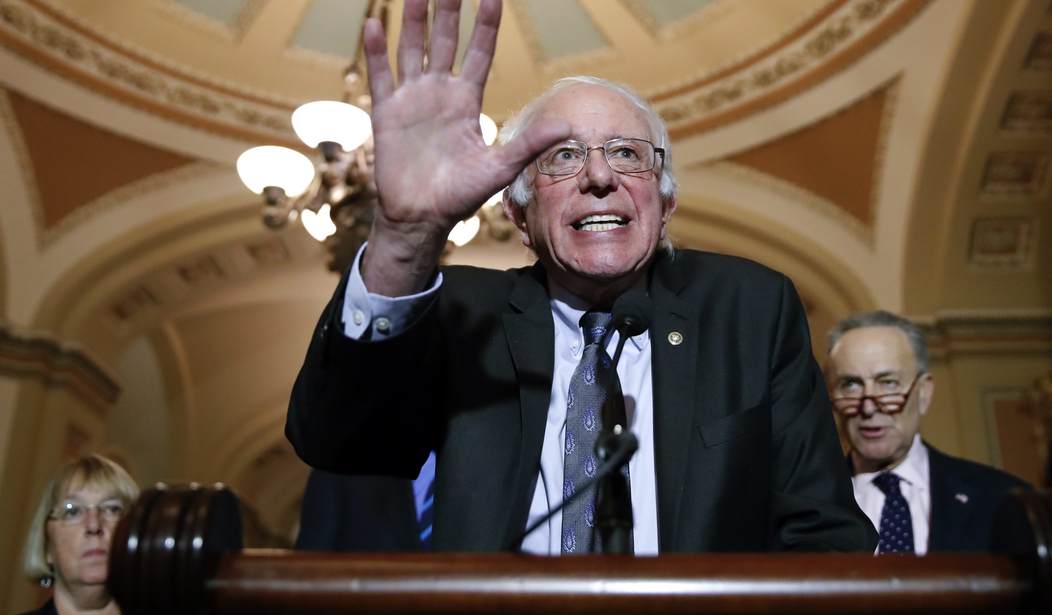A poll by the nonpartisan Jewish Electoral Institute (JEI) in late February, when it still seemed that Bernie Sanders was the Democratic frontrunner, found that Sanders “would overwhelmingly outperform US President Donald Trump with Jewish voters in a head-to-head match-up this fall”—to the tune of 65% to 30%.
This was despite the fact of “only 52% of American Jews having a favorable view of Sanders and 45% having an unfavorable view of him.”
Presumably, that relatively low approval rate reflected—at least in part—the fact that Sanders had called Israel’s government racist, called for cutting aid to Israel, and “surrounded himself with antisemitic surrogates, allies and advisers, including Linda Sarsour, Ilhan Omar, Rashida Tlaib, Cornel West, James Zogby and others.”
And yet—notwithstanding that considerable dislike—Sanders, for American Jews, came in only slightly behind the other Democratic candidates at the time: “Buttigieg would [defeat Trump] 69% to 31%; Bloomberg 67% to 28%; Biden 67% to 31%; and Warren 65% to 32%.”
And all that was notwithstanding the fact that Trump has racked up a dramatically pro-Israel record that includes: moving the U.S. embassy from Tel Aviv to Jerusalem; refusing to fund the Palestinians’ pay-for-slay policy; recognizing Israeli sovereignty over the Golan Heights; proposing a peace plan that takes Israel’s security into account and is endorsed by both Prime Minister Netanyahu and opposition leader Benny Gantz; and—I would add—ceasing to make Israel a constant focus of public criticism and instead expressing friendship and appreciation.
And to all that must be added—though not a policy dealing specifically with Israel—the stringent economic pressures Trump has imposed on Iran and, indirectly, on its proxies, with results that have made Israel’s neighborhood, for now, much less hazardous to it.
But if we set the Israel issue aside for a moment, there’s no mystery about why American Jews tend so heavily to the Democratic side; it simply fits their demographic profile. Democratic voters are known to score high on educational level (having gotten degrees from left-wing indoctrination centers known as universities) and low on religiosity; American Jews fit both descriptions.
Regarding education, an exhaustive 2013 Pew Center study of American Jews found that:
Most Jews are college graduates (58%), including 28% who say they have earned a post-graduate degree. By comparison, 29% of U.S. adults say they graduated from college, including 10% who have a post-graduate degree.
And as for religiosity, the same survey notes:
Secularism has a long tradition in Jewish life in America, and most U.S. Jews seem to recognize this: 62% say being Jewish is mainly a matter of ancestry and culture, while just 15% say it is mainly a matter of religion….
By several conventional measures, Jews tend to be less religious than the U.S. public as a whole…. Just 26% of U.S. Jews say religion is very important in their lives, compared with 56% of the general public.
Not surprisingly, then:
As a whole, Jews support the Democratic Party over the Republican Party by more than three-to-one: 70% say they are Democrats or lean toward the Democratic Party, while 22% are Republicans or lean Republican.
Only one, much more religious American Jewish group stands out as an exception:
Among Orthodox Jews…the balance tilts in the other direction: 57% are Republican or lean Republican, and 36% are Democrats or lean Democratic.
And what about Israel, then? Does a candidate’s—whether Democrat or Republican—policy on Israel at least tilt this rigid pattern of American Jewish voting in one direction or another?
The abovementioned JEI survey in late February is one of many that have found that it doesn’t.
In fact:
While a large majority of US Jewish voters disapprove of Trump’s performance on domestic policy issues…a slim majority approves his management of US-Israel relations.
Fifty-one percent said they supported his Israel policies; 39% said they didn’t. A slightly larger majority (52%) said they approved of his decision to recognize Israeli sovereignty of the Golan Heights.
In other words, even acknowledgment of Trump’s pro-Israel record doesn’t change the picture much. Or as the survey also found:
Only 32% of Jewish voters characterized Israel as “one of the most important” issues to them in the upcoming election. Of far greater concern to Jews are healthcare, medicare and social security, and gun safety.
To sum up, then, most American Jews vote Democrat because it fits their demographic profile and because—at least when the chips are down and it comes to casting a ballot—Israel isn’t that important to them.
As a Jew who grew up in America and has been living in Israel for 35 years, I have some emotional difficulty with the last clause of that sentence. But, on the other hand, it accords with what the Zionist movement predicted as far back as the nineteenth century: that among Diaspora Jews in comfortable countries, Jewish affiliation would fade.









Join the conversation as a VIP Member